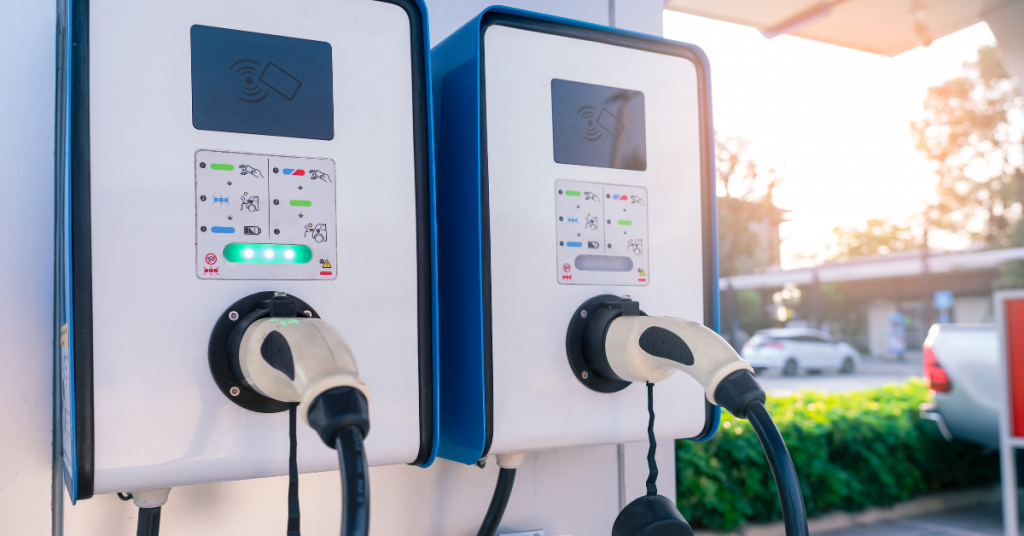What Is an EV Charger?
An EV charger is a device used to power up an electric car. Some are mounted on a wall, and others are free-standing units placed near parking areas. There are slower options for overnight use and faster ones for people in a rush. Most people charge at home, which is cheaper and more practical.
If you’re considering switching to electric, it makes sense to look at EV chargers early on. These can be installed at home without much trouble and are designed to work with most car brands. Some plug straight into a wall socket, while others require a separate unit installed by someone with the right tools.

Charging Times and Speed Differences
Not all chargers work at the same speed. Some can charge a battery fully in four hours, while others might take eight or ten. Fast chargers can provide enough power in under an hour, but they usually cost more. For home use, a slower charger often works just fine if you plug in overnight.
The charging speed depends on the charger’s power output and the battery size in your car. If you drive a lot and don’t have time to wait, it may be worth looking into a faster unit. If your trips are short, a standard charger will be enough.
Home Charging vs Public Charging
Charging at home is the easiest way to keep your car ready. It’s more flexible and often costs less than public stations. Most homes can handle the setup. A small space near a plug point or garage is enough.
Still, public chargers are useful when you’re travelling longer distances. Shopping malls, petrol stations, and office parks often have chargers. Some are fast, but others may be slower or in use when you arrive. Having your own charger helps avoid these issues.
Safety and Setup
When it comes to safety, proper installation is key. Good electric car chargers have built-in safety features. They stop charging once the battery is full and protect against power surges. If you install the charger properly and follow the instructions, it should work safely for years.
Avoid using makeshift cables or cheap tools. Stick with certified chargers and ask a qualified person to help with setup if needed. This reduces the risk of damage to your car or home.
How Much Does Charging Cost?
Charging at home is cheaper than buying petrol. You pay only for the electricity used. Some chargers even allow you to choose when to charge. For example, you can set it to charge during off-peak hours when electricity is cheaper.
The cost of buying and installing a charger depends on the model. Slower options are more affordable, while fast chargers cost more. Over time, the fuel savings make up for the cost of the charger. If you drive every day, the savings add up quickly.
What Features Are Worth Having?
Some chargers are very basic, while others come with extras. These can include long cables, simple displays, and app controls. For some people, having a longer cable makes charging easier, especially if the parking area is tight.
Make sure the charger is compatible with your car. Most modern chargers work with a range of electric vehicles, but it’s always better to double-check. If you want extra features, go for a model that suits your space, car, and driving habits.
Where to Shop for EV Chargers
You can find electric vehicle chargers online. The product pages often include clear details and prices. Some offer same-day delivery or quick shipping options. It’s simple to compare models and choose one that works for you.
Look for options that are clearly described. Read what other users say about the charger. Products with clear specs and photos make it easier to decide. If the item includes a return policy or warranty, that’s an extra bonus.
Do You Still Need Public Chargers?
Even with a home charger, public charging stations are useful. They’re handy for long trips or if your home power is down. They are often placed near major roads, shopping centres, or office blocks. Some are fast, and others are slower. Some charge per hour, and some per unit of power.
It’s a good idea to keep a charging cable in your car for these moments. That way, you’re ready no matter where you are. While you may not need them daily, they are good to have as a backup.
Looking After Your Charger
A good charger doesn’t need much attention. Wipe the plug clean now and then. Don’t twist the cable too tightly when packing it away. If it’s placed outdoors, try to keep it covered when it rains. If anything seems wrong, like a loose cable or strange smell, stop using it and get someone to check.
With normal use, your charger should last for years. Small actions like keeping it dry and checking for damage go a long way.
Final Thoughts
Having a charger at home is a smart move for anyone with an electric car. It saves time, cuts fuel costs, and gives peace of mind. Whether you drive daily or just a few times a week, the right setup makes everything easier. Choose wisely, install it well, and you’ll be ready to drive anytime.